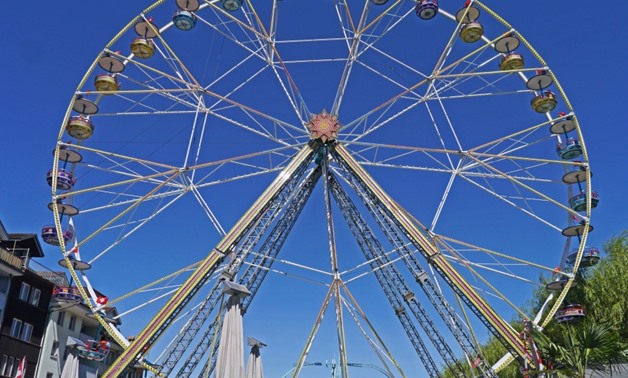
wheel at the amusement park - Courtesy by PIXNIO
CAIRO - 11 August 2018:The steady march of digital technology over the past decade has led to enhanced recognition of entertainment channels and mediums globally.
Globalization has played an integral role in developing awareness of internationally-renowned family entertainment hubs, with ease of cross-border transportation. With significant global growth in the industry, the world has looked upon the opportunity within the Middle East to see new developments from international associations of attractions, to promote tourism and attract direct foreign investment. Egypt has seemingly received minimal attention from these new developers despite its progress in political stability.
This part of the region has endured the most skepticism by international tourists over the past decade. However, the region has bounced back and made significant progress, from the shorelines of Dubai’s waters to Egypt’s Pharaonic tombs. The UN World Tourism Organization Barometer reported a 13% increase in tourist arrivals in North Africa, and a 5% increase in the Middle East. Egypt’s GDP is expected to grow 5.5% in the 2018-2019 fiscal year, driven mainly by a recovery in tourism and rising natural gas output.
The entertainment business is vast and has increasingly proven to develop international touristic appeal. This market includes music, sports, gaming, fashion and theatrical performances—all of which have potential to be hosted in Egypt. The country promoted tourism by signing a sponsorship deal with FIFA World Cup as the first African Investor in 2018, however, limited efforts have been made in the field of family entertainment. The last time an international theatrical tour arrived in Egypt was in 2016 when the touring band of Ice Age visited Cairo.
Why is Egypt considered an untapped potential?
Egypt is a vast market, with a population surpassing 99 million people, and boasts safety conditions outranking both the US, the UK and the entire African continent (placing 16th out of 135 countries in global security ranking). Egypt’s strategic location in North Africa and closeness to the Arab Peninsula make it a transcontinental nation with the largest and most diversified economies in the Middle East. Should international investors decide to set up entertainment hubs in Egypt, there is potential to increase traffic from the GCC countries, African nations and Europe.
The existing progress of Egypt’s tourism leads to better apprehension of foreign investment opportunities. Egypt’s tourism revenues increased more than 80% in the first quarter of 2018 to $2.2 billion with 2.3 million tourists. The long-awaited Grand Egyptian Museum, constructed by approximately 5,000 workers, will become the world’s largest museum devoted to a single civilization. The completion of this museum conveys the considerable investment the Egyptian government is capable of, contributing to world records and raising global standards.
Moreover, new development projects like the New Administrative Capital have showcased the conceivable success of state-of-the-art, topnotch infrastructure, facilities and services that are set to be well maintained. While 1,350 feddans are being developed, there should be considerable appreciation of the potential likely to materialize from entertainment and leisure attractions.
Commercial oversight from the entertainment industry
Substantial investments by commercial malls for entertainment options is a growing trend internationally, and the UAE has successfully established this with commercial investors. Advanced technological tools, international appeal and high-quality facilities all setting a benchmark for the region. Family Entertainment Centres have been considered as the main pillars of tourism attractions; continuous innovations including virtual reality gaming, 3D technology and traditional entertainment options visited by entire families with sentimental values from generations of visitors. The theme park and amusement market across the globe alone is projected to generate revenues of almost $32.1 billion in 2017, with remarkable growth set in the GCC region.
Millennials have been prioritized by entertainment and media companies, considered as the largest segment of society with purchasing power directed toward the industry. Live events—whether musical, theatrical or athletics—have trumped traditional commercial entertainment mediums amongst millennials in recent years. This may be a consequence of the intention to develop user-generated content on social networks, creating more shareable experiences playing into recognition and influence. Companies and their respective brands have leveraged these sources as an attractive mechanism to bring in fan recruitment, transforming the sales function into a social response to sustainable, profitable growth.
The future of Egypt’s economy is dependent on the diversity of investments in various disciplines. With tourism’s progress and the encouragement of foreign direct investment, there is distinct hope in the sustainability of progress and maturity of Egypt’s economy over the next decade. The entertainment industry is seemingly an untapped potential—a unique opportunity for the government and international investors to become regional leaders in the category, starting with Egypt’s vast market.

Comments
Leave a Comment